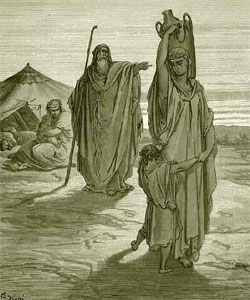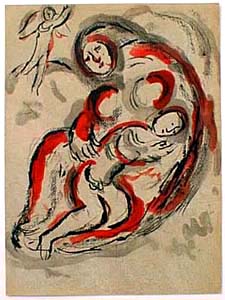Ishmael: God Hears and Sees
For Sunday June 19, 2005
Lectionary Readings (Revised Common Lectionary, Year A)
Genesis 21:8–21 or Jeremiah 20:7–13
Psalm 86:1–10 or Psalm 69:7–18
Romans 6:1–11
Matthew 10:24–39
 |
Abraham casts out Hagar and Ishmael, by Gustav Dore. |
I don't know what everyday life brings in your community, but I suspect that if you open your ears and eyes to what is right in front of you, your community is similar to mine. Here is the news from Palo Alto from just the past week or so. The barometer of human pain is very high.
Driving home from work yesterday, my wife detoured to avoid a traffic snarl, and as she did she noticed fire trucks and police cars at an intersection near our house. In the trunk of one of the police cars was a horribly mangled bike. That bike belonged to Phil, a 72-year-old man who is now in critical condition at Stanford Hospital with two broken legs and multiple other injuries after a Ford Expedition ran a stop sign and hit him so hard that it knocked both his shoes off and threw him 40 feet. Police found Craig, the forty-year-old driver, about an hour later, drunk and sleeping in some bushes, his driver-side door open and his three-year old son crying in his car seat.
Lord, you see and you hear.
The day before, at 8pm Palo Alto police arrested one of our football moms after she skipped her court hearing on multiple charges stemming from several incidents of drug possession, DUI, and child endangerment. Cheryl's two sons were teammates with my older son on the football team. At a party last October where she shoveled copious amounts of alcohol to the kids, her son and a friend beat a third high schooler we knew so badly that he needed facial reconstructive surgery.
Lord, you see and you hear.
 |
Abraham pleads to Sarah for Hagar, by Willem Bartius. |
Marlo, another football teammate of both my boys, was buried this week. He killed himself a week ago when he blasted his girlfriend's Volkswagen Passat down a residential street at 100 miles per hour at 4:30 in the morning. When his car hit a slight bump on a bridge it went airborne, slammed through a wall, a sign and a tree, rolled over two cars parked at our grocery store, then sheared in half. Juan, his passenger buddy, remains in critical condition at Stanford Hospital. We used to joke about Marlo when he came to football practice with an ankle bracelet because he was under house arrest. Now it doesn't seem so funny.
Lord, you see and you hear.
Over the last eight months I have visited my friend Don in the hospital perhaps 40 times. He had just moved home after eight months in the hospital, but yesterday he was rushed back to Stanford's intensive care unit when pneumonia made breathing almost impossible and his blood pressure plummeted. After eight months of hospital bills for critical care, a friend has advised Don's family that declaring bankruptcy might be their best option.
In church on Sunday leaders announced that Jay, one of our pastors whose ministry I greatly admire (and still do), resigned from staff due to severe strains in his marriage. Jay and his wife have three very young kids.
Lord, you see and you hear.
When I walked down to Walgreens I met 6-year-old Deshawn who was loitering aimlessly in front of the store. When I asked him if he needed help big tears welled from his eyes as he explained how his cousin had chased him with a knife in his apartment just down the street, and that he was scared and couldn't go back there. No dad seemed present, mom had gone to the store, and he didn't remember any phone numbers we might call.
Lord, you see and you hear.
 |
Hagar in the desert by Marc Chagall. |
Finally, I just returned from visiting my mother in a small town in North Carolina where I grew up. She lives at Windy Hill's assisted-living facility, and at age 83 both her brain and her body now betray her, as they will all of us sooner or later. She sported a black eye after falling in the middle of the night. An employee was caught sleeping on her sofa in the middle of the night. As I roamed the hallways of her Windy Hill, peeked into other rooms, and reminisced with my brother who lives near mom, I realized that perhaps a dozen of her friends, all of whom were formative adults during my teenage years, live in the same facility. Janet smoked for decades and now lugs a canister of oxygen around because of emphysema. Philip had a leg amputated. My sister-in-law's father sits in a wheelchair most all the day, chin to chest, staring at the floor. Judge Senter is there, as is Doris, who cuddles a plastic baby doll to her shoulder as if it were a newborn. Estelle Tilley, my ninth grade English teacher, seemed to remember me.
Lord, you see and you hear.
After God promised Abraham a progeny with his wife Sarah, they both laughed in disbelief, then took matters into their own hands. When Sarah remained barren she insisted that Abraham father a child with her slave Hagar. Predictably, the pregnancy provoked Sarah's acrimony and jealousy, and so she banished Hagar to the desert. Yahweh found her there, told her to return, and gave her a promise almost identical to the promise made to Abraham, that He would make her descendants "too numerous to count." The child to be born would bear a special name, too, Ishmael, which in Hebrew means "God hears," for "the Lord has heard of your misery." In turn, Hagar named Yahweh "the God who sees me," and in a delightful play on words exclaims, "I have seen the One who sees me." (see Genesis 16:1–6).
Fast forward fifteen years to our lectionary text for this week, which back tracks to the story of Ishmael. Isaac's birth reopened festering wounds and simmering jealousies, so once again Sarah drove Hagar and the teenage Ishmael into the desert. Wandering in the desert of Beersheba, her waterskins empty, she abandoned Ishmael to die "and began to sob" with the love of a mother for her child. The Genesis storyteller then once again invokes a delightful word play on Ishmael's name to drive home his point, saying, "God heard the boy crying." This is something like saying "God heard the boy named God hears." Yahweh then made an extraordinary promise to Hagar that is almost identical to the pivotal promise made to Abraham: "I will make him into a great nation...God was with the boy" (Genesis 21:18, 20; see 12:2).
Ishmael, the heir of Islam, cousin to Jews and Christians (all three trace their ancestry to Abraham), bears a name that signals a promise to every human being. God is not deaf, dumb or blind. He is not implacable, impersonal, or impassible, without feeling or emotion. He is not an absentee landlord deity. No, Christians believe that He sees every human misery, and that He hears every painful sob. As the Hebrews would learn after four centuries of slavery and exploitation under Egypt, "God heard their groaning" (Exodus 2:24). Knowing and believing that was the first step in their transformation and liberation from bondage. The same is true for us today: Ishmael, God hears.





